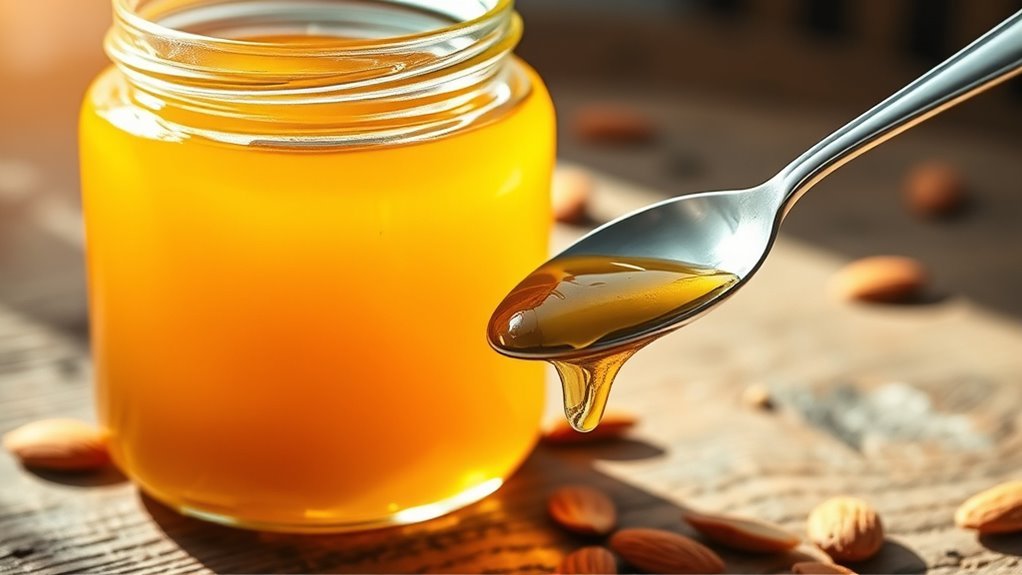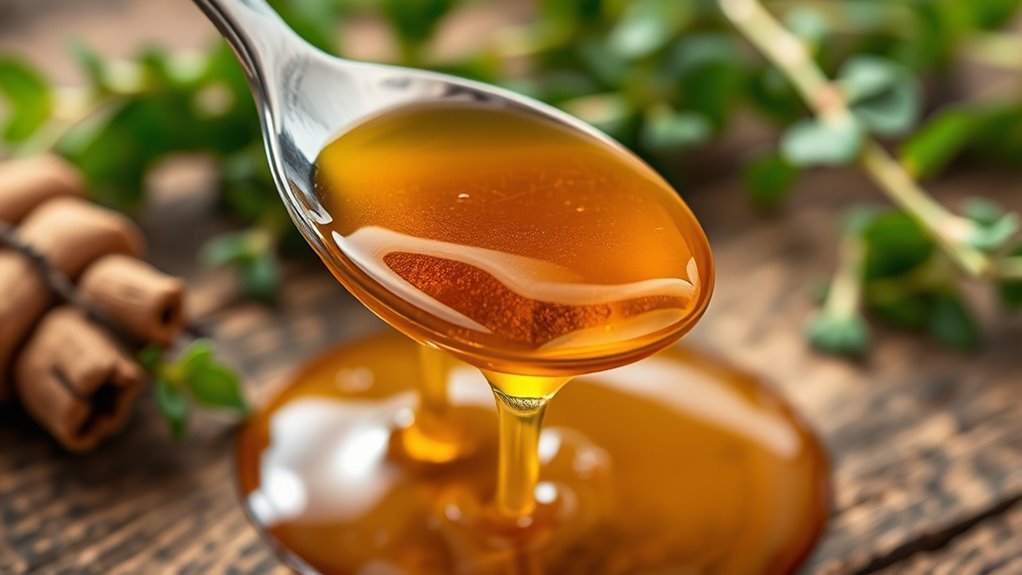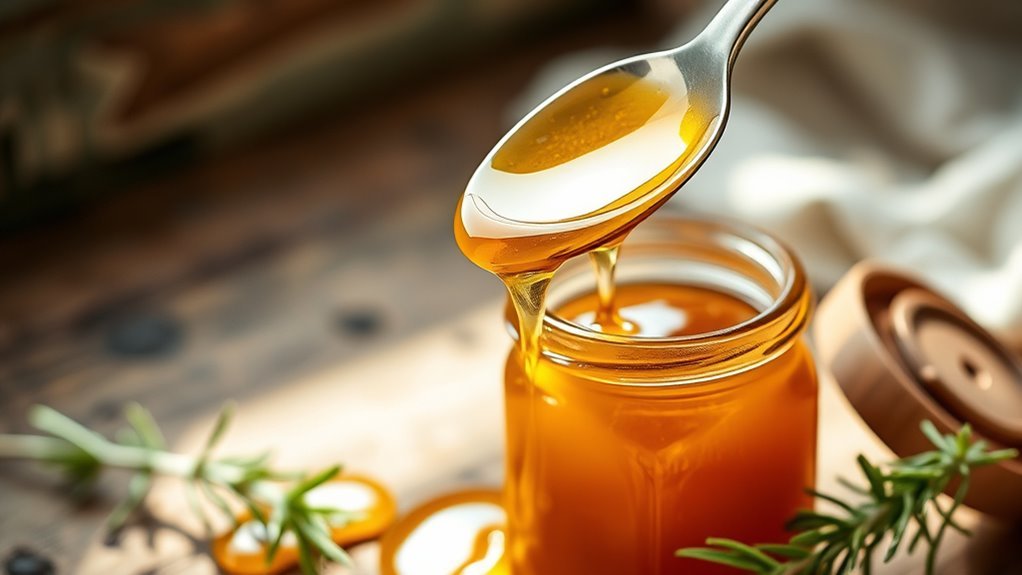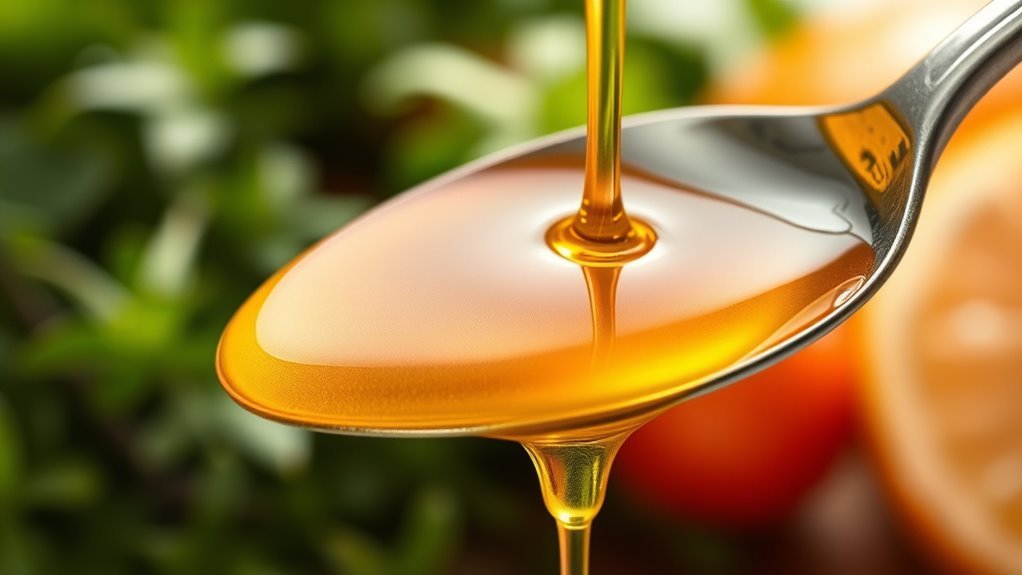You can have a teaspoon of honey on keto, but it’s crucial to take into account its carbs. One teaspoon contains about 5.7 grams of carbohydrates, which can add up quickly if you’re aiming for a daily limit of 20 to 50 grams. While honey offers health benefits like antioxidants, moderation is key to maintaining ketosis. Pairing it with fats can help balance your macros. Want to know more about sweetener options and strategies for your keto journey?
Understanding the Ketogenic Diet

When you explore the ketogenic diet, it’s essential to understand its core principles. The keto basics revolve around considerably reducing carbohydrate intake while increasing healthy fats. This shift encourages your body to enter a metabolic state called ketosis, where it burns fat for fuel instead of carbs. However, it comes with dietary restrictions; you’ll need to limit sugar, grains, and starchy vegetables. Embracing this diet can offer freedom from sugar crashes and promote weight loss, but be mindful of the long-term effects. It’s vital to focus on whole, nutrient-dense foods, ensuring you get enough vitamins and minerals. Always consult with a healthcare professional before making drastic changes to your diet, as individual needs may vary.
The Nutritional Profile of Honey

While the ketogenic diet emphasizes low-carb and high-fat foods, it’s important to examine how certain natural sweeteners fit within this framework. Honey, known for its rich flavor and potential nutritional benefits, has a unique composition. It primarily consists of fructose and glucose, along with trace vitamins, minerals, and antioxidants. This composition lends honey its energy-boosting properties and may offer antimicrobial effects. However, it’s vital to note that these benefits come with a carbohydrate load that can impact ketosis. If you’re looking to incorporate honey into your diet, understanding its nutritional profile can help you make informed choices. Balancing taste with your keto goals can provide a satisfying experience without sacrificing your dietary freedom.
Carbohydrate Content and Ketosis

Understanding the carbohydrate content of honey is vital if you’re aiming to maintain ketosis on a ketogenic diet. A teaspoon of honey contains about 5.7 grams of carbohydrates, which can greatly impact your daily carb allowance. If you’re carb counting, even small amounts can add up, potentially disrupting ketosis maintenance. For many on keto, the target is typically around 20 to 50 grams of carbs per day. So, that teaspoon of honey could take a sizable bite out of your limit. While honey has natural benefits, its carbohydrate content means you have to be cautious. Balancing the enjoyment of honey with your ketogenic goals is essential, so always weigh your options carefully.
Potential Health Benefits of Honey
Although honey’s carbohydrate content can complicate your ketogenic journey, it also boasts a range of potential health benefits that may warrant consideration. Honey’s antioxidant properties are well-documented, helping to combat oxidative stress in your body. By reducing inflammation and supporting overall immune function, it may promote better health outcomes. Additionally, honey has been linked to improved digestive health, thanks to its prebiotic effects, which can nourish beneficial gut bacteria. While moderation is key, incorporating a small amount of honey into your diet could enhance your meals and provide these health benefits. Just remember to balance it with your overall carb intake, ensuring you stay aligned with your ketogenic goals while enjoying the unique advantages honey offers.
The Impact of Honey on Blood Sugar Levels
When considering honey on a keto diet, it’s essential to understand its impact on blood sugar levels. Honey has a glycemic index that can vary considerably compared to other sweeteners, affecting your insulin response. Examining these metabolic effects can help you make an informed choice about incorporating honey into your diet.
Glycemic Index Comparison
While honey is often praised for its natural sweetness and health benefits, its impact on blood sugar levels is an important consideration for those following a ketogenic diet. Honey has a glycemic load that can vary, but it typically falls between 45 and 64 on the glycemic index, which means it can raise blood sugar levels more than other low-carb sweeteners. Its fructose content, though lower than table sugar, still contributes to this effect. If you’re seeking to maintain stable blood sugar levels, even a teaspoon of honey could disrupt your ketosis. It’s vital to weigh the natural allure of honey against your dietary goals, ensuring you make informed choices that align with your keto lifestyle.
Insulin Response Analysis
Understanding the insulin response to different foods is essential for anyone on a ketogenic diet, especially when considering sweeteners like honey. Honey, while natural, can impact your blood glucose levels considerably. Consuming even a teaspoon can provoke an insulin response, potentially hindering your goals of maintaining low insulin sensitivity. This spike in insulin may lead to increased fat storage and disrupt the metabolic state of ketosis you’re aiming for.
For many, keeping blood glucose levels stable is vital for overall health and energy. If you choose to indulge in honey, it’s wise to monitor how it affects your body. Being aware of your body’s reactions helps you maintain the freedom to enjoy treats while staying committed to your keto lifestyle.
Metabolic Effects Overview
The metabolic effects of honey on blood sugar levels can be significant, especially for those following a ketogenic diet. When you consume honey, it enters your bloodstream quickly, which can activate various metabolic pathways. This rapid absorption can lead to a spike in blood sugar levels, potentially disrupting your state of ketosis. While honey does provide a source of energy production, its high glycemic index means it might not align with the low-carb principles of keto. You may find that even a teaspoon can affect your body’s insulin response. If you’re considering honey, it’s important to weigh the potential benefits against its impact on your metabolic balance and overall diet goals. Freedom in choices requires understanding their consequences.
Strategies for Incorporating Honey Into a Keto Diet
Incorporating honey into a keto diet can be a delicious yet challenging endeavor, especially since traditional keto guidelines limit sugar intake. However, with some strategies, you can enjoy honey while maintaining keto flexibility:
Incorporating honey into a keto diet can be challenging, but with the right strategies, it can be enjoyed in moderation.
- Choose raw, unprocessed honey for its potential health benefits.
- Use honey in moderation, keeping your total carb count in check.
- Pair honey with high-fat foods, like cheese or nuts, to balance your macros.
- Limit honey to special occasions to avoid disrupting ketosis.
- Monitor your body’s response, adjusting your intake based on how it affects your ketone levels.
Alternative Sweeteners for Keto
When it comes to sweetening your keto meals, knowing the best keto-friendly sweeteners is essential. You’ll find a range of options, from natural choices like stevia and erythritol to artificial alternatives, each with its own pros and cons. Understanding sweetener conversion ratios can also help you achieve the right flavor without compromising your dietary goals.
Best Keto Sweeteners
Finding suitable sweeteners on a keto diet can be challenging, especially since traditional sugars are off-limits. Fortunately, there are several honey alternatives that not only fit your dietary needs but also offer diverse flavor profiles. Here are some of the best keto sweeteners you can consider:
- Stevia: A natural sweetener with zero calories and a unique flavor.
- Erythritol: A sugar alcohol that closely mimics sugar’s sweetness with minimal carbs.
- Monk Fruit: A zero-calorie sweetener derived from monk fruit, offering a pleasant taste.
- Allulose: A low-calorie sugar that tastes similar to sugar without impacting blood sugar levels.
- Xylitol: Another sugar alcohol that can provide a sweet taste but may affect some people’s digestion.
Choose the one that suits your palate best!
Natural vs. Artificial Options
While many people on a keto diet seek sweeteners to satisfy their cravings, the choice between natural and artificial options can greatly impact health and taste preferences. Natural sweeteners like stevia and erythritol are popular honey alternatives, providing sweetness without raising blood sugar levels. They’re derived from plants and usually contain fewer calories. On the other hand, artificial sweeteners such as aspartame or sucralose, while effective sugar substitutes, may raise concerns about long-term health effects. Some prefer the taste of natural sweeteners, feeling they offer a more authentic flavor profile. However, others might opt for artificial sweeteners due to their convenience. Ultimately, it’s essential to evaluate your personal health goals and taste preferences when choosing your sweetener.
Sweetener Conversion Ratios
Choosing the right sweetener for your keto diet involves not just health considerations but also understanding how different sweeteners convert in recipes. Knowing the sweetener ratios and their conversion factors can make or break your dish. Here are some common alternatives and their ratios:
- Erythritol: 1:1 ratio to sugar
- Stevia: Approximately 1 teaspoon equals 1 cup of sugar
- Monk Fruit: 1:1 ratio; check brands for variations
- Xylitol: 1:1 ratio to sugar, but not always keto-friendly
- Allulose: 1:1 ratio to sugar, low-calorie
Personalizing Your Carb Allowance
As you commence your keto journey, personalizing your carb allowance is essential for achieving ideal results. Everyone’s body responds differently to carbohydrates, so understanding your personal limits can make a significant difference. Carb flexibility is key; it allows you to experiment with your intake to find what works best for you. Start by tracking your daily carb consumption and how it affects your energy levels and weight loss. Consider factors such as activity level, metabolic rate, and overall health. This personalized approach not only supports your ketogenic goals but also fosters a sense of freedom in your dietary choices. Remember, the ultimate aim is to find a sustainable balance that fits your lifestyle while still promoting ketosis.
Making Informed Choices for Your Keto Journey
Making informed choices on your keto journey is essential for long-term success, especially when maneuvering through the myriad of foods available. Embracing keto flexibility can empower you to enjoy a variety of foods while staying on track. Here are some tips for mindful indulgence:
- Always check nutritional labels for hidden carbs.
- Opt for whole, unprocessed foods whenever possible.
- Consider portion sizes to maintain your carb limit.
- Experiment with keto-friendly substitutes for your favorite treats.
- Stay connected with a supportive community for shared experiences.
Frequently Asked Questions
Can Honey Be Part of a Strict Keto Diet?
Honey’s not typically part of a strict keto diet due to its high sugar content, which can kick you out of ketosis. Instead, consider honey alternatives like stevia, erythritol, or monk fruit, which provide sweetness without the carbs. These keto sweeteners can help satisfy your cravings while keeping your carb intake low. If you want to include a bit of honey, just be mindful of the amount and track your overall carb intake.
How Does Honey Affect Weight Loss on Keto?
Honey can act like a tempting siren when you’re pursuing weight loss on keto. While it offers some health benefits, its high sugar content can hinder your progress. Incorporating honey may derail the keto benefits, as it can spike insulin levels, making it harder for your body to burn fat. If you’re looking for freedom in your diet, consider using low-carb alternatives that won’t compromise your weight loss goals. Stay mindful!
Is Raw Honey Better Than Processed Honey for Keto?
Raw honey is generally considered better than processed honey due to its higher nutritional value and potential health benefits. Raw honey retains enzymes, antioxidants, and nutrients that processed honey often loses during refining. While both types contain sugars, raw honey might offer more health benefits, such as anti-inflammatory properties. However, both can impact your carb intake, so moderation’s key. Always consider your overall keto goals when choosing between the two.
Can I Use Honey for Keto-Friendly Recipes?
You can use honey in keto-friendly recipes, but it’s best to contemplate keto substitutions. Honey is high in carbohydrates, which can disrupt ketosis. Instead, try honey alternatives like erythritol or stevia for sweetness without the carbs. These options allow you to enjoy your favorite flavors while staying aligned with your keto goals. Remember, moderation is key, and experimenting with different sweeteners can lead to delicious, guilt-free treats!
What Happens if I Exceed My Carb Limit With Honey?
If you exceed your carb limit with honey, you might kick yourself out of ketosis, impacting your weight loss goals. Honey has a high carb impact, which can spike insulin levels. To stay on track, consider honey alternatives like stevia or erythritol, which provide sweetness without the carbs. It’s about finding a balance that works for you, allowing for freedom in your diet while still respecting your ketogenic lifestyle.
Frequently Asked Questions
1. Can I have a teaspoon of honey on a keto diet?
While honey is a natural sweetener, it is not typically recommended on a ketogenic (keto) diet due to its high sugar content. A teaspoon of honey contains approximately 5-6 grams of carbohydrates, which can quickly add up and may kick you out of ketosis. If you are following a strict keto regimen, it is advisable to limit or avoid honey and opt for low-carb sweeteners like stevia or erythritol instead.
2. What are the carbohydrate limits on a keto diet?
On a typical keto diet, the carbohydrate intake is usually limited to about 20-50 grams of net carbs per day. This limit is essential for achieving and maintaining a state of ketosis, where your body burns fat for fuel instead of carbohydrates. Since honey can contribute significantly to your daily carb allowance, it is crucial to consider its impact if you choose to consume it.
3. Are there any health benefits to consuming honey?
Honey has several health benefits, including antibacterial and anti-inflammatory properties, as well as antioxidants. It can also provide a quick source of energy. However, these benefits must be weighed against its high sugar content, particularly for those on a ketogenic diet. If you are not in strict ketosis or you have a higher carb allowance, a small amount of honey can be beneficial, but moderation is key.
4. What are some keto-friendly alternatives to honey?
There are several keto-friendly alternatives to honey, including:
- Stevia: A natural, zero-calorie sweetener derived from the leaves of the stevia plant.
- Erythritol: A sugar alcohol that is low in calories and has little to no impact on blood sugar levels.
- Monk fruit sweetener: A natural sweetener made from monk fruit that contains zero carbs and calories.
- Allulose: A rare sugar that is low in calories and does not affect blood sugar levels significantly.
These alternatives can be used in various recipes and can provide the sweetness without the carbs associated with honey.
5. Can I consume honey in moderation while on keto?
While it’s technically possible to consume honey in moderation on a keto diet, it requires careful tracking of your total carbohydrate intake. If you decide to include honey, it is crucial to account for the carbs it adds to your daily total. For some people, a very small amount of honey might not significantly affect ketosis, but for others, it could be enough to hinder progress. Always listen to your body and adjust your intake accordingly.
References
- https://www.healthline.com/nutrition/keto-diet-and-honey
- https://www.ncbi.nlm.nih.gov/pmc/articles/PMC6520950/
- https://www.diabetes.org/nutrition/healthy-food-choices-made-easy/sweeteners
- https://www.webmd.com/diet/obesity/honey-benefits
- https://www.mayoclinic.org/healthy-lifestyle/nutrition-and-healthy-eating/expert-answers/honey/faq-20057982
- https://www.washingtonpost.com/lifestyle/wellness/is-honey-keto-friendly/2021/09/29/9e0c9ed6-1b1b-11ec-8a3d-4b5e2b1e9a0a_story.html


